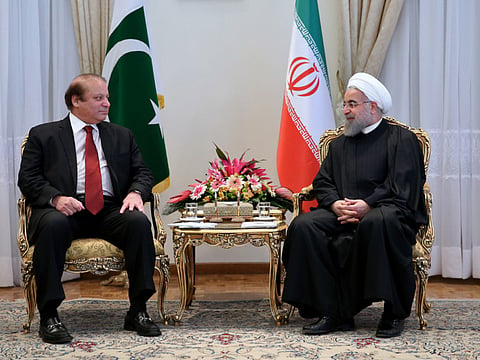Pakistan offers to host Saudi-Iran reconciliation talks
Riyadh accuses Iran of sowing ‘sedition, unrest, chaos’

Islamabad, Riyadh: Pakistan’s prime minister offered Tuesday to host talks between Iran and Saudi Arabia aimed at resolving disputes between the Middle Eastern rivals.
Nawaz Sharif met Iranian President Hassan Rouhani in Tehran, a day after meeting Saudi Arabia’s King Salman in Riyadh. After his meeting with Rouhani, Sharif told reporters that Iran had expressed an interest in improving relations with Saudi Arabia and would appoint a focal person for future talks.
Sharif said he would speak to Saudi Arabia to encourage the appointment of a focal person, and described reconciling the two countries as Pakistan’s “prime duty and sacred mission.”
Iran’s State TV said that Rouhani welcomed the prospect of improved regional ties with Saudi Arabia. He said that relations with the kingdom could improve if Saudi Arabia pledged to respect the rights of Shiites.
Pakistan’s Foreign Ministry says that Islamabad is deeply concerned at the recent escalation of tensions between Saudi Arabia and Iran. Tensions between the two worsened after Saudi Arabia executed a prominent Saudi Shiite cleric who was an outspoken opposition figure on January 2. Angry mobs in Iran stormed the Saudi embassy, and Riyadh severed diplomatic relations with Tehran in protest.
He said on Tuesday that Saudi Arabia would never negotiate on “our faith and our security”. On an international level, the continued engagement by the United States was the key to maintaining stability.
“It depends on where will these funds go. If they go to support the nefarious activities of the Iranian regime, this will be a negative and it will generate a pushback. If they go towards improving the living standards of the Iranian people then it will be something that would be welcome,” he said.
Asked if Saudi Arabia had discussed seeking a bomb in the event that Iran managed to obtain one despite the deal over its atomic programme, he replied: “I don’t think it would be a logical to expect us to discuss any such issue in public and I don’t think it would be reasonable to expect me to answer this question one way or another.
“There are two things that we don’t negotiate over in Saudi Arabia. Our faith and our security. We will do whatever we need to do in order to protect our people and our nation,” he added.
US Secretary of State John Kerry cautioned both Saudi Arabia and Pakistan against indulging in trade of nuclear weapons, saying there will be “all kinds of NPT consequences” if they went ahead with any such plan.
“Sure we’ve heard those things. But you can’t just buy a bomb and transfer (a nuclear bomb),” Kerry told CNN.
“There’s all kinds of NPT consequences. I mean, there are huge implications of that,” Kerry said, referring to the strong nuclear Non-Proliferation Treaty (NPT).
Sign up for the Daily Briefing
Get the latest news and updates straight to your inbox



